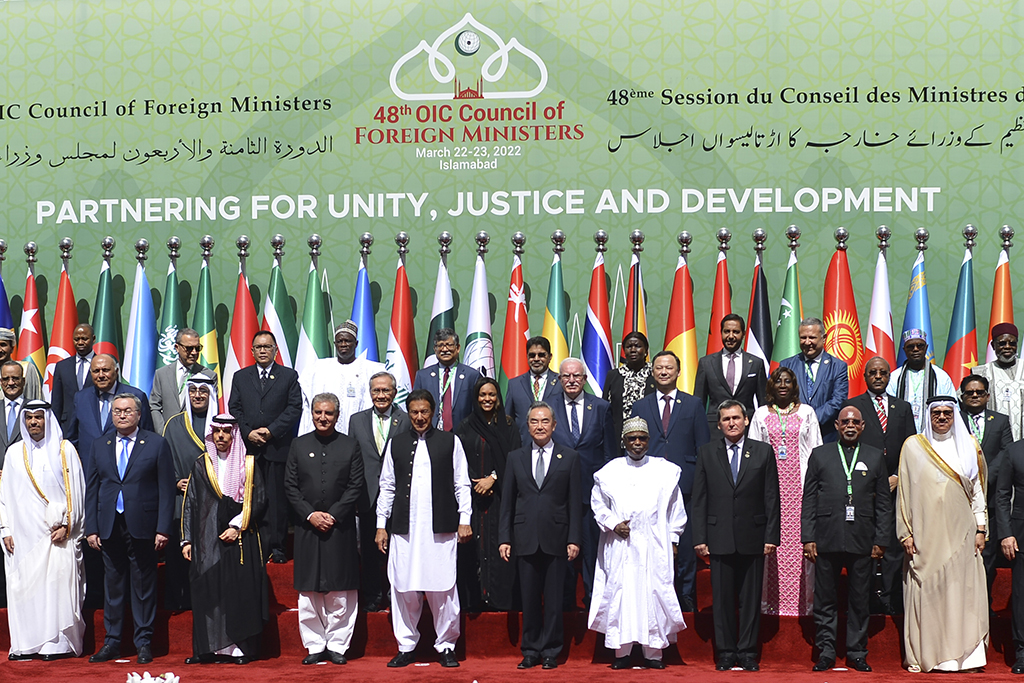ISLAMABAD: Pakistan Prime Minister Imran Khan trumpeted his Islamic credentials on Tuesday at a meeting of foreign ministers from Muslim nations, even as he battles the most serious domestic challenge to his rule since coming to power. The Organization of Islamic Cooperation (OIC) is meeting in Islamabad with an ambitious agenda that seeks approval for over 100 declarations, including aid for financially strapped Afghanistan and support for the Palestinians and Kashmir.
The meeting is also attended by China's Foreign Minister Wang Yi, despite Beijing being accused of detaining more than a million Uyghur and other Turkic-speaking Muslims in political re-education camps across Xinjiang. "China and the Islamic world have found a path of friendly coexistence and win-win cooperation between different civilizations, which serves as a model for a new form of diplomatic ties," Wang said.
Khan is hosting the conference whilst scrambling to fight a no-confidence vote in the National Assembly as early as next week, with the opposition accusing him of mismanaging the economy and foreign policy. In an address to dozens of foreign ministers, he partly blamed Muslims for allowing Islamaphobia to spread, saying they had not united against actions deemed blasphemous for fear of being labelled extremist.
"There is a perception that there is different types of Islam," he told the 57-nation IOC gathering. "The moment you say you are a moderate Muslim, you acknowledge extremism," he added, saying this suggested there was division on the issue of blasphemy. Violent protests have broken out across Pakistan in recent years over Western acts deemed blasphemous, including the publishing of cartoons of Prophet Muhammad (PBUH).
Khan long campaigned against growing anti-Muslim sentiment, and takes credit for the UN's move last week to adopt an International Day to Combat Islamaphobia. In a speech that at times seemed aimed more at a domestic audience than a gathering of foreign diplomats, Khan said he was inspired to enter politics by the example of the "perfect" society that Prophet Muhammad (PBUH) created in Madinah centuries ago. He also railed against corruption among the elite and what he called permissiveness in Pakistan, a state that has grown increasingly conservative and patriarchal over the past four decades.
Khan won office in 2018 through an electorate weary of the two-party dynasties that have dominated Pakistan politics since independence - periods of power punctuated by military coups - but with inflation skyrocketing and a feeble rupee, he has struggled to maintain support. Political analysts say he has also lost the backing of the powerful military.
"I think the army leadership must be extremely concerned seeing what is happening on the political scene at the moment," said Talat Masood, a retired general-turned-political analyst. Khan has called for a million of his supporters to rally in the capital next week to put pressure on dozens of National Assembly members who are reported to be considering voting against him. The leaders of the two main opposition parties have also called for their supporters to gather.
The no-confidence motion is scheduled to be formally introduced on Friday with a vote next week, but horse-trading is common in Pakistan politics and the rebels could well return to the fold before then. "He has managed his own and allied political parties poorly," political analyst Hasan Askari Rizvi said of Khan. "It was his failure to keep the party and allies together that has brought him to this."
The return of the Taleban to power in neighboring Afghanistan has also provoked a resurgence of militancy in Pakistan - including the bombing of a Shiite mosque in Peshawar last month claimed by the local chapter of Islamic State that killed more than 60 people. With flaring domestic issues, Khan has tried to position himself on the international stage, but his insistence on continuing with a visit to Moscow last month as Russian troops invaded Ukraine perplexed even his most ardent admirers.
He was also one of the few world leaders to attend the opening of the Beijing Winter Olympics when others boycotted in protest at China's human rights record. There are several scenarios at play for Pakistan this week. Khan's Pakistan Tehreek-e-Insaf (PTI) party is pursuing a court case against rebellious members that could force them to follow the whip. Another tactic is for parties to, quite literally, hold lawmakers hostage and prevent them from voting or having a quorum. And even if Khan does lose the vote, there will likely be a series of challenges both inside and outside the assembly. - AFP











